The Balkans non-paper and the dangers of Plan B
Only a firm framework of integration can bring long-term stability to the Balkans – this is as relevant today as it was in 2003, when EU leaders offered membership to all countries in the region
Across the Balkans, there is talk of a non-paper that seems to have a non-author, but that has brought to the surface all the contradictions and complexities of the region.
It was a media outlet in Sarajevo that first disclosed a Slovenian government paper that discussed the radical ideas of breaking up Bosnia and of a region centred around a ‘Greater Albania’, a ‘Greater Serbia’, and a ‘Greater Croatia’. Since then, everyone has tried to distance themselves from the paper, knowing that talk of such ideas is often for show.
But the paper has served to illustrate that, if Plan A for the region – integration with the European Union – doesn’t work, then we are heading towards a Plan B involving new conflicts and borders.
At a 2003 meeting in Thessaloniki, EU leaders took the far-sighted strategic decision to offer membership of the union to the entire region. It had become obvious that, after a decade of wars and disintegration, only a firm framework of integration could bring long-term stability to the Balkans.
That strategic insight is as valid today as it was then. But, unfortunately, EU leaders seem to have forgotten it. With mounting scepticism about further enlargement of the EU, often driven by short-term domestic policy considerations, the momentum of the enlargement process has gradually been lost – and the bloc is losing the leverage it has in the region to encourage both reform and reintegration. To quote a famous European statesman, the EU’s process of integration with the Balkans has become
“brain dead” in the last few years.
Leaders in the region itself haven’t always helped. Often primarily keen on preserving existing systems of power and privilege, they have often been slow to implement the necessary reforms. And the EU has often been too formalistic in its approach – ticking boxes more than really transforming structures.
One can only hope that the non-paper will serve as a wake-up call for the EU and others on the risks of a stalled enlargement process and rapidly waning interest in the affairs of the region.
But, with the enlargement process stalling and the integration framework for the region weakening, it’s unavoidable that old tensions will reappear. Violence returned to the streets of Belfast as the framework for the Northern Ireland peace agreement that was provided by both Ireland and the United Kingdom being EU members disappeared (although the violence is not solely due to the EU-UK dispute over the sea border), and the same logic of development that we saw in Belfast risks reappearing in the Balkans in the years ahead.
Prolonged international efforts to bring peace to the region after the dissolution of Yugoslavia were based on the fundamental premise of preserving existing borders and boundaries. The then-leaders of Croatia and Serbia, Franjo Tudjman and Slobodan Milosevic, plotted to divide Bosnia up. But the international community stood firm in opposition to the move, aiming to preserve multicultural societies in both Bosnia and North Macedonia, and to protect minorities everywhere else – in Kosovo, Serbia, and Croatia.
The non-paper with a non-author now effectively argues that, if Plan A no longer works, we have to get ready for a Plan B that involves redrawing borders and accepting a new wave of ethnic dislocation throughout the region (peaceful or otherwise). It’s a brutal statement on the brutal reality that might lie ahead.
One can only hope that the non-paper will serve as a wake-up call for the EU and others on the risks of a stalled enlargement process and rapidly waning interest in the affairs of the region. And the EU is not alone in having gone asleep – the United Kingdom, after decades of engagement with the Balkans, didn’t even mention the region in its recent Integrated Review.
What is needed is a new Thessaloniki initiative: strategic engagement with the region by the EU and others. That’s doesn’t mean just occasionally adding a few more decibels to announcements of existing policies, as we have seen now and then in the past. The EU may need to sharpen its existing instruments, rethink its institutional arrangements, and give far more clout and relevance to various intermediate stages of integration.
The Balkans is not a simple place. Millennia of multicultural empires have left a mosaic that has been difficult to fit into our modern mould of mono-nation states. But, for reasons that go far beyond short-term stability, it’s certainly worth preserving what is still there of this old mosaic and avoiding yet another round of painful disintegration. The framework of European integration is, for better or worse, the only means of doing so. If that is lost, we may well have to face the reality of Plan B. And, sooner or later, the Balkans could be back in the headlines for all the wrong reasons.
This article first appeared in French in France Ouest.
The European Council on Foreign Relations does not take collective positions. ECFR publications only represent the views of their individual authors.



